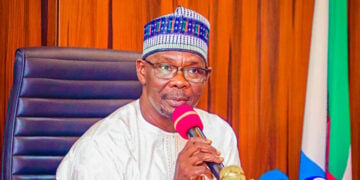Nigeria is losing an estimated $56 billion every year to the devastating impact of malnutrition, Vice President Kashim Shettima has disclosed, describing the crisis as both a human tragedy and an economic threat to the nation’s future.
Speaking at the High-Level Conference on Mobilising Against Malnutrition in Katsina and the North-West, the Vice President, represented by his Senior Special Adviser on Public Health, Mrs. Uju Vanstatia Rochas-Anwukah, said the challenge demands urgent and coordinated national action.
He declared that, “There is no greater test of our humanity than how we respond to hunger in the land,” urging leaders at all levels to make nutrition a national priority.
Shettima also commended Katsina State governor, Dikko Umaru Radda, for what he described as a proactive and exemplary approach to combating malnutrition, calling Katsina’s initiatives “a model and a timely response to a national tragedy.”
The vice president lamented that child malnutrition remains “a silent crisis that weakens our children, limits our potential, and haunts our collective conscience,” adding that when a nation’s children suffer from stunted growth, its future too becomes stunted.
The VP stressed that the cost of inaction was staggering, saying Nigeria loses billions in human capital productivity annually, while every dollar invested in nutrition yields a return of 23 dollars.
He reaffirmed the Federal Government’s commitment under President Bola Tinubu to decentralising nutrition programmes through the Nutrition 774 Initiative to ensure that no community was left behind.
“This conference must not end with communiqués and photographs. Let it end with commitments and timelines. The child in Dutsin-Ma, the mother in Jibia, the family in Funtua they cannot afford our delays”, he warned.
Governor Radda, in his remarks, said the gathering was not just a policy event but a collective response to an emergency threatening the very foundation of the future, the wellbeing of children.
He reaffirmed his administration’s resolve to move from awareness to action and revealed that the state had undertaken comprehensive reforms in the health sector, including massive investments and measurable improvements in service delivery.
Radda said the state government had contributed ₦1 billion to the Child Nutrition Fund in partnership with UNICEF between 2023 and 2025, upgraded hundreds of healthcare facilities, and employed more than 1,600 frontline workers.
He also disclosed plans to expand Outpatient Therapeutic Feeding Centres across 12 local government areas, establish Tom-Brown and Ready-to-Use Therapeutic Food factories, and distribute 90,000 bags of grains to vulnerable households.
According to him, Katsina is also considering the approval of six-month maternity leave, as well as full implementation of the Child Protection Law and a new Family Law to address social factors that worsen child malnutrition.
“We are setting up local production of Tom-Brown and RUTF to stimulate our economy and create jobs for our youth, but we cannot do it alone. We call for sustained partnership from donors, traditional rulers, civil society, and development partners. Let us leave this conference not with promises, but with actionable commitments”, the governor said
The Country Representative of Médecins Sans Frontières (MSF), Dr. Ahmed Aldikhari, disclosed that Nigeria has now become the country where the organisation treats the highest number of malnourished children globally.
He said nearly 300,000 Nigerian children suffering from severe acute malnutrition were admitted in 2024 alone, more than half of MSF’s total global admissions.
He attributed the crisis to the country’s population size and the hunger gap affecting northern Sahelian regions.
Aldikhari commended Shettima for declaring malnutrition a national emergency in March 2025, stressing that both federal and state governments must work with partners to scale up treatment and prevention programmes.
He said the idea for the conference stemmed from discussions with Governor Radda on the urgent need to expand interventions and align understanding across all sectors to transform commitments into tangible, life-saving actions.
The conference drew participation from representatives of the diplomatic community and humanitarian organisations, including the German, EU, Swiss and French envoys, alongside key Nigerian officials such as the Commissioners for Health and Budget and Planning, senior government advisers and development experts.





